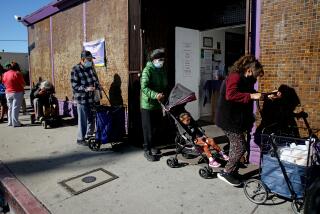The Homeless Are Getting Younger
- Share via
Think of the homeless, and the snapshot that comes to mind is a dirty, destitute and disheveled man, perhaps drunk or on drugs, down on his luck, carrying all his possessions in a bag. It’s true that single men make up the largest segment of the nation’s homeless population, but families are quickly joining the ranks of urban misery.
Now, increasingly, the snapshot must include homeless children.
One out of four homeless persons is a child, according to the U.S. Conference of Mayors. And families with children make up the fastest growing segment of the nation’s urban homeless population, the conference reported last week in a survey of homelessness and hunger in 27 cities, including Los Angeles and New York.
These families, primarily mothers with small children, represent 36% of the homeless. This reflects a 2% increase over last year, and the experts say there is no reason to believe the growth rate will taper off any time soon.
The paths to homelessness vary, but the lack of affordable housing is the major cause. Any interruption in income that keeps the rent from being paid can mean sudden homelessness for poor mothers. The patterns are tragically common: a divorce, an illness, an accident or a loss of job. These can cause a mother to lose an apartment. Unlike more fortunate women, very poor mothers rarely have savings to fall back on, or parents or other family members to turn to for help. Often their only option is the streets.
Their stories are tragically familiar. Two researchers who are studying 100 homeless mothers in Southland shelters encounter the same causes over and over. Drugs, alcohol abuse and violence are recurring, significant factors, according to Donald E. Miller, an associate professor of social ethics at USC and Barry Jay Seltser, senior research associate for Social Issues Research. Next month they are scheduled to complete their survey, which was undertaken at the request of Las Familias del Pueblo, a social service center for mothers with children on Skid Row.
The women interviewed in that survey reveal the details of misery. Mothers, they say, are more likely than single women to leave a spouse or boyfriend who is using or selling drugs. Mothers flee because they are terrified their children will become involved, or will be taken away. But they quickly discover there is no place to go or, if they are lucky, they find space in a shelter. Homeless shelters are turning away 1,800 people each night in Los Angeles, according to a study released two months ago by state Senate President Pro Tem David A. Roberti (D-Hollywood). Those numbers are sure to go up as the temperatures go down.
When there is no room in a shelter, desperate women house their children in cars, in cheap motels and hotels, or any place they can find. This is no way to spend Christmas. Just ask the homeless children who have no tree, no toys, no joy. Many shelters are supported by charitable contributions, but not enough compassionate people reach deep enough into their pockets to try and help. Please give.
More to Read
Sign up for Essential California
The most important California stories and recommendations in your inbox every morning.
You may occasionally receive promotional content from the Los Angeles Times.






